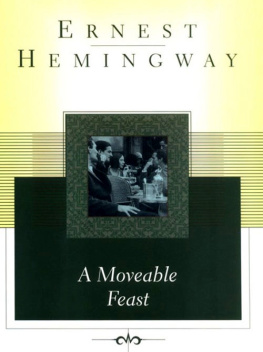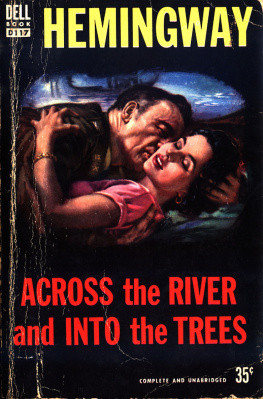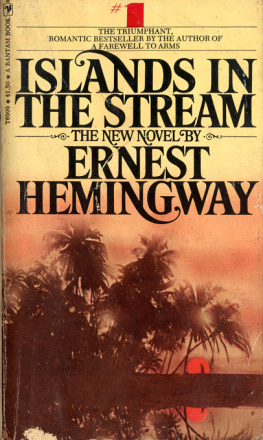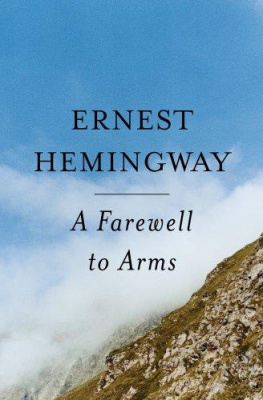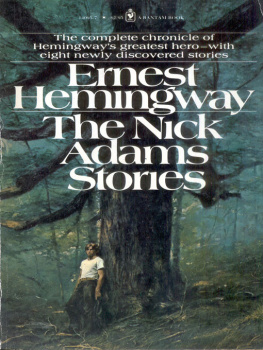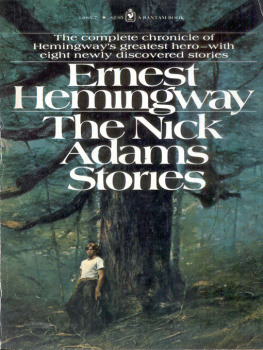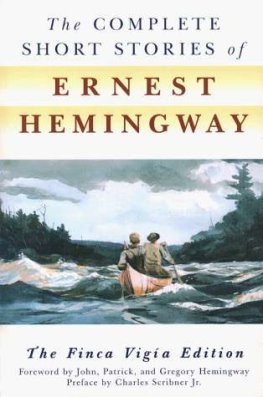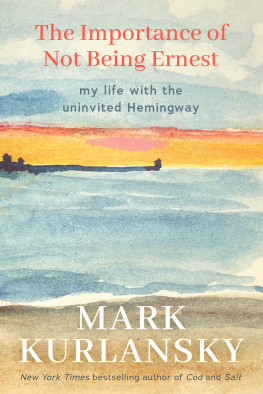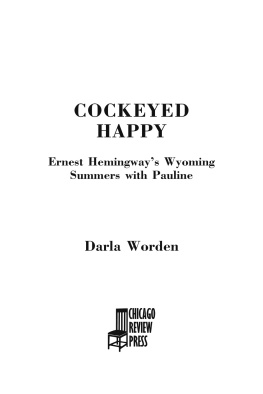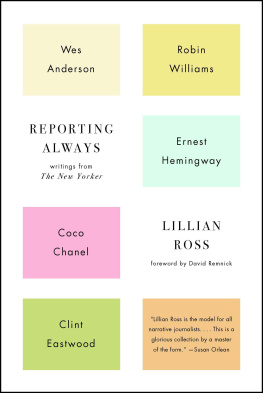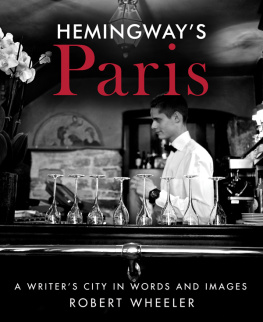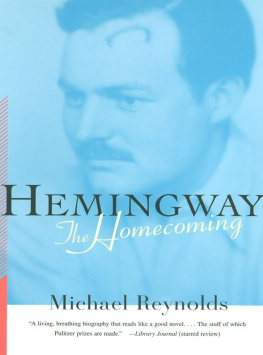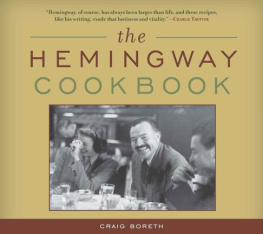Ernest Hemingway - A Moveable Feast (Scribner Classic)
Here you can read online Ernest Hemingway - A Moveable Feast (Scribner Classic) full text of the book (entire story) in english for free. Download pdf and epub, get meaning, cover and reviews about this ebook. year: 1983, publisher: Macmillan Pub Co, genre: Art. Description of the work, (preface) as well as reviews are available. Best literature library LitArk.com created for fans of good reading and offers a wide selection of genres:
Romance novel
Science fiction
Adventure
Detective
Science
History
Home and family
Prose
Art
Politics
Computer
Non-fiction
Religion
Business
Children
Humor
Choose a favorite category and find really read worthwhile books. Enjoy immersion in the world of imagination, feel the emotions of the characters or learn something new for yourself, make an fascinating discovery.
- Book:A Moveable Feast (Scribner Classic)
- Author:
- Publisher:Macmillan Pub Co
- Genre:
- Year:1983
- Rating:5 / 5
- Favourites:Add to favourites
- Your mark:
- 100
- 1
- 2
- 3
- 4
- 5
A Moveable Feast (Scribner Classic): summary, description and annotation
We offer to read an annotation, description, summary or preface (depends on what the author of the book "A Moveable Feast (Scribner Classic)" wrote himself). If you haven't found the necessary information about the book — write in the comments, we will try to find it.
A Moveable Feast (Scribner Classic) — read online for free the complete book (whole text) full work
Below is the text of the book, divided by pages. System saving the place of the last page read, allows you to conveniently read the book "A Moveable Feast (Scribner Classic)" online for free, without having to search again every time where you left off. Put a bookmark, and you can go to the page where you finished reading at any time.
Font size:
Interval:
Bookmark:
ErnestHemingway
If you are lucky enough to have lived inParis as a young man, then wherever you go for the rest of your life, it stayswith you, for Paris is a moveable feast.
ErnestHemingway
Toa friend, 1950
Forreasons sufficient to the writer, many places, people, observations andimpressions have been left out of this book. Some were secrets and some wereknown by everyone and everyone has written about them and will doubtless writemore.
Thereis no mention of the Stade Anastasie where the boxers served as waiters at thetables set out under the trees and the ring was in the garden. Nor of trainingwith Larry Gains, nor the great twenty-round fights at the cirque d'hiver. Norof such good friends as Charlie Sweeny, Bill Bird and Mike Strater, nor ofAndre Masson and Miro.
Thereis no mention of our voyages to the black forest or of our one-day explorationsof the forests that we loved around Paris. It would be fine if all these werein this book but we will have to do without them for now.
Ifthe reader prefers, this book may be regarded as fiction. But there is alwaysthe chance that such a book of fiction may throw some light on what has beenwritten as fact.
ERNESTHEMINGWAY
SanFrancisco de Paula, Cuba 1960
AGood Caf on the Place St.-Michel
Thenthere was the bad weather. It would come in one day when the fall was over. Wewould have to shut the windows in the night against the rain and the cold windwould strip the leaves from the trees in the Place Contrescarpe. The leaves laysodden in the rain and the wind drove the rain against the big green autobus atthe terminal and the cafe des amateurs was crowded and the windows misted overfrom the heat and the smoke inside. It was a sad, evilly run cafe where thedrunkards of the quarter crowded together and i kept away from it because ofthe smell of dirty bodies and the sour smell of drunkenness. the men and womenwho frequented the amateurs stayed drunk all of the time, or all of the timethey could afford it, mostly on wine which they bought by the half-litre orlitre. Many strangely named aperitifs were advertised, but few people couldafford them except as a foundation to build their wine drunks on. The womendrunkards were called poivrottes, which meant female rummies.
Thecafe des amateurs was the cesspool of the rue mouffetard, that wonderful narrowcrowded market street which led into the place contrescarpe. The squat toiletsof the old apartment houses, one by the side of the stairs on each floor withthe two cleated cement shoe-shaped elevations on each side of the aperture so alocataire would not slip, emptied into cesspools which were emptied bypumping into horse-drawn tank wagons at night. in the summer time, with allwindows open, we would hear the pumping and the odour was very strong. the tankwagons were painted brown and saffron colour and in the moonlight when theyworked the rue cardinal lemoine their wheeled, horse-drawn cylinders lookedlike braque paintings. no one emptied the cafe des amateurs though, and itsyellowed poster stating the terms and penalties of the law against publicdrunkenness was as flyblown and disregarded as its clients were constant andill-smelling.
Allof the sadness of the city came suddenly with the first cold rains of winter,and there were no more tops to the high white houses as you walked but only thewet blackness of the street and the closed doors of the small shops, the herbsellers, the stationery and the newspaper shops, the midwife - second class -and the hotel where verlaine had died, where i had a room on the top floorwhere i worked.
Itwas either six or eight flights up to the top floor and it was very cold and iknew how much it would cost for a bundle of small twigs, three wire-wrappedpackets of short, half-pencil length pieces of split pine to catch fire fromthe twigs, and then the bundle of half-dried lengths of hard wood that i mustbuy to make a fire that would warm the room. so i went to the far side of thestreet to look up at the roof in the rain and see if any chimneys were going,and how the smoke blew. there was no smoke and i thought about how the chimneywould be cold and might not draw and of the room possibly filling with smoke,and the fuel wasted, and the money gone with it, and i walked on in the rain. iwalked down past the lycee henri quatre and the ancient church ofst-etienne-du-mont and the windswept place du pantheon and cut in for shelterto the right and finally came out on the lee side of the boulevard st-micheland worked on down it past the cluny and the boulevard st-germain until i cameto a good cafe that i knew on the place st-michel.
Itwas a pleasant cafe, warm and clean and friendly, and i hung up my oldwaterproof on the coat rack to dry and put my worn and weathered felt hat onthe rack above the bench and ordered a cafe au lait. the waiter brought it and i took out anotebook from the pocket of the coat and a pencil and started to write. i waswriting about up in michigan and since it was a wild, cold, blowing day it wasthat sort of day in the story. i had already seen the end of fall come throughboyhood, youth and young manhood, and in one place you could write about itbetter than in another. that was called transplanting yourself, i thought, andit could be as necessary with people as with other sorts of growing things. butin the story the boys were drinking and this made me thirsty and i ordered arum st james. this tasted wonderful on the cold day and i kept on writing,feeling very well and feeling the good martinique rum warm me all through mybody and my spirit.
Agirl came in the cafe and sat by herself at a table near the window. she wasvery pretty with a face fresh as a newly minted coin if they minted coins insmooth flesh with rain-freshened skin, and her hair was black as a crow's wingand cut sharply and diagonally across her cheek.
Ilooked at her and she disturbed me and made me very excited. i wished i couldput her in the story, or anywhere, but she had placed herself so she couldwatch the street and the entry and i knew she was waiting for someone. so iwent on writing.
Thestory was writing itself and i was having a hard time keeping up with it. iordered another rum st james and i watched the girl whenever i looked up, orwhen i sharpened the pencil with a pencil sharpener with the shavings curlinginto the saucer under my drink.
I'veseen you, beauty, and you belong to me now, whoever you are waiting for and ifi never see you again, i thought. you belong to me and all paris belongs to meand i belong to this notebook and this pencil.
Theni went back to writing and i entered far into the story and was lost in it. iwas writing it now and it was not writing itself and i did not look up nor knowanything about the time nor think where i was nor order any more rum st james.i was tired of rum st james without thinking about it. then the story wasfinished and i was very tired. i read the last paragraph and then i looked upand looked for the girl and she had gone. i hope she's gone with a good man, ithought. but i felt sad.
Iclosed up the story in the notebook and put it in my inside pocket and i askedthe waiter for a dozen portugaises and a half-carafe of the dry white wine theyhad there.
Afterwriting a story i was always empty and both sad and happy, as though i had madelove, and i was sure this was a very good story although i would not know trulyhow good until i read it over the next day.
Asi ate the oysters with their strong taste of the sea and their faint metallictaste that the cold white wine washed away, leaving only the sea taste and thesucculent texture, and as i drank their cold liquid from each shell and washedit down with the crisp taste of the wine, i lost the empty feeling and began tobe happy and to make plans.
Font size:
Interval:
Bookmark:
Similar books «A Moveable Feast (Scribner Classic)»
Look at similar books to A Moveable Feast (Scribner Classic). We have selected literature similar in name and meaning in the hope of providing readers with more options to find new, interesting, not yet read works.
Discussion, reviews of the book A Moveable Feast (Scribner Classic) and just readers' own opinions. Leave your comments, write what you think about the work, its meaning or the main characters. Specify what exactly you liked and what you didn't like, and why you think so.

